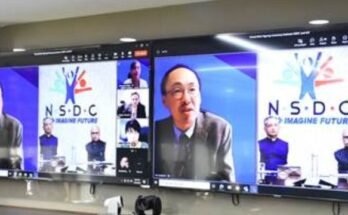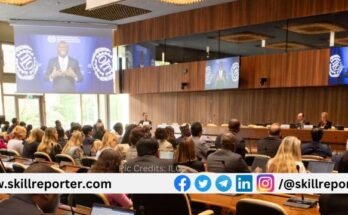Just like so many other countries, India grapples with developing a skilled workforce. India is not alone in its quest to close the gap between industrial demands and skills and training provision.
On Wednesday 6th December 2023, in conjunction with the Department for Business and Trade, the UK High Commission in India and the Government of India, the UK Skills Partnership delivered an Online UK-India Skills Showcase and Dialogue. This cross-border dialogue aimed to foster a mutual understanding of the challenges and opportunities in skilling, laying the groundwork for a collaborative approach to meet the demands of the 21st-century workforce.
In an era defined by rapid technological advancements and dynamic global markets, the collaboration between nations becomes imperative to address the evolving needs of industries. The webinar between the United Kingdom and India served as a significant milestone, delving into the current skilling priorities for industries in alignment with the National Education Policy 2020 (NEP 2020) in India.
The National Education Policy 2020, introduced by the Government of India, envisions a holistic transformation of the education system to cater to the needs of the rapidly changing global landscape. One of the key pillars of NEP 2020 is a focus on skill development, aiming to make education more practical and industry-oriented. The policy emphasizes the integration of vocational education and hands-on learning experiences, preparing students to thrive in diverse professional environments.
The UK-India dialogue session brought together government officials, skills experts, policymakers, and industry leaders to discuss and analyze the current skills priorities for industries. The presentations and discussions revolved around identifying skill gaps, understanding emerging trends, and formulating strategies to align educational curricula with industry requirements. The speakers highlighted the importance of fostering innovation, adaptability, and digital literacy to meet the evolving demands of various sectors.
While speaking in the session Mr K T Rajan, Cluster Head – Technology, Innovation, Education & Skills at the Department for Business and Trade – South Asia, British High Commission, Bengaluru, India said “While India is the most populous country, it is also the fastest growing economy among the G20. From an economic, social & political perspective, two of its priority areas to stimulate growth are education & employability. With globally acknowledged expertise in these domains, it is an opportune moment for UK’s skills, solutions and service providers to leverage the Indian market potential and work together to solve skills gaps/ employability issues.”
“There is no doubt that skills development is a major priority for India and the UK. Through strong partnership, skills training providers in both countries can achieve great things together and make a massive impact to society, employers, education establishments and individual students. Technical and vocational training is a first choice, every time choice. Never a second choice or bad choice.” stated Jonathan Ledger, Skills and Professional Bodies Specialist at the Department for Business and Trade, London.
In the United Kingdom, technical and vocational skills development is a cornerstone of the education system, aiming to equip individuals with practical competencies relevant to specific industries. The government, in collaboration with educational institutions and industry stakeholders, has various initiatives to promote high quality technical and vocational education. Apprenticeships, for example, play a pivotal role in combining on-the-job training with classroom learning, providing individuals with a direct pathway into the workforce while meeting the skill requirements of industries.
“Pearson BTEC qualifications are being offered to students across India, to prepare learners for a successful career in industry with hands-on practical learning. Our Pearson BTEC qualifications are offered at Universities, Colleges, International Schools and Private Training Centres in various states in over 30 Pearson approved Centres as we look to we expand our presence quickly. Working with partners, such as the National Skill Development Corporation International (NSDCI) Pearson hopes to initiate the adoption of vocational qualifications across India.” said Annabel Lawday, Strategic Lead – Stakeholder engagement, HE and International Workforce skills team, Pearson.
“I was very pleased to be part of the UK Indian Skills Showcase for AAT as we are keen to explore this potential market. It was a lively and well-attended session, and we will develop new contacts and opportunities because of the event.” said Tim Dawkins, International Development Lead, AAT
“We are looking forward to collaborate with more teaching institutions in India, to upskill talented students with CTH vocational qualifications for working in the Hospitality & Tourism industry.” mentioned Steve Beckworth. Director of Marketing and Business Development, Confederation of Tourism and Hospitality – CTH.
“I am delighted that NPTC Group of Colleges was part of the UK Government Department for Business and Trade’s UK-India Skills Showcase Dialogue conference. During this important event, NPTC Group’s India Associate, Gagan Aggarwal, highlighted our experience and steadfast commitment to promoting excellence in skills training within India. We are dedicated to advancing green skills and technology, raising the bar for teacher training, and equipping future trainers with the necessary skills through our comprehensive programmes.” James Llewellyn, Director of Worldwide Operations, NPTC Group of Colleges
“RSL has worked in India for over a decade, providing high-quality creative arts qualifications across music, dance, drama, public speaking and vocational qualifications. Our success is built upon our approach of listening to our customers and developing qualifications that are industry relevant and territory specific.” Nathan Theodoulou, Director of Product & Marketing, RSL Awards Ltd
Investing in technical and vocational skills and aligning skills education with industry needs is not just about individual success, but is fundamental to the prosperity and well-being of nations. It ensures a sustainable and resilient future, where citizens are empowered to contribute meaningfully to society and the global community.
Important Takeaways:
- Industry – Skills Provision Collaboration: A recurring theme in the discussions was the need for stronger ties between skills and training providers and industry. Collaborative efforts were emphasized to bridge the gap between theoretical knowledge and practical skills, ensuring that students are better prepared for the workplace.
- Digital Transformation: The webinar underscored the paramount importance of digital skills in the contemporary job market. As industries undergo rapid digital transformation, there is a growing demand for a workforce proficient in technologies such as artificial intelligence, data analytics, and cybersecurity.
- Lifelong Learning: The concept of lifelong learning emerged as a critical component in the skilling landscape. Participants acknowledged the necessity of continuous upskilling and reskilling to stay relevant in a world where job roles are evolving swiftly.
- Inclusive Skilling: Discussions also touched upon the importance of inclusive skilling initiatives, ensuring that diverse segments of the population, including women and marginalised communities, have equal access to quality education and training opportunities.
- Global Perspectives: Participants shared global perspectives on skills initiatives. Insights from the UK offered valuable benchmarks and best practices, contributing to a more comprehensive understanding of effective skilling strategies on an international scale.
- Emphasis on Soft Skills: Beyond technical expertise, the discussions underscored the importance of soft skills in the contemporary workforce. Both the UK and India recognised the need for cultivating skills such as communication, critical thinking, and adaptability to enhance overall employability.
- Public-Private Partnerships: Speakers and contributors highlighted the significance of fostering strong public-private partnerships in driving skilling initiatives. Collaborations between government entities, educational institutions, and private enterprises were emphasised as instrumental in creating holistic skilling ecosystems.
- Addressing Future Facing Skills Challenges: With the advent of Industry 4.0 and other technologies, presentations delved into how skills priorities are evolving to meet the challenges posed by automation, artificial intelligence, key enabling technologies and other transformative technologies. The discussions aimed to identify strategies for preparing the workforce for the jobs of the future.
This UK-India Skills Showcase webinar not only addressed immediate skills priorities, but also delved into broader aspects of global collaboration, soft skills development, public-private partnerships, and strategies for navigating the challenges and opportunities presented by the Fourth Industrial Revolution and future-facing skills.
The session ended with a commitment to develop further collaborative efforts between the UK and India in addressing the skills priorities outlined in the NEP 2020. Potential avenues for joint initiatives will explored to strengthen the ties between the two nations and enhance the employability of their respective workforces.
Source: UK Skills Partnership




